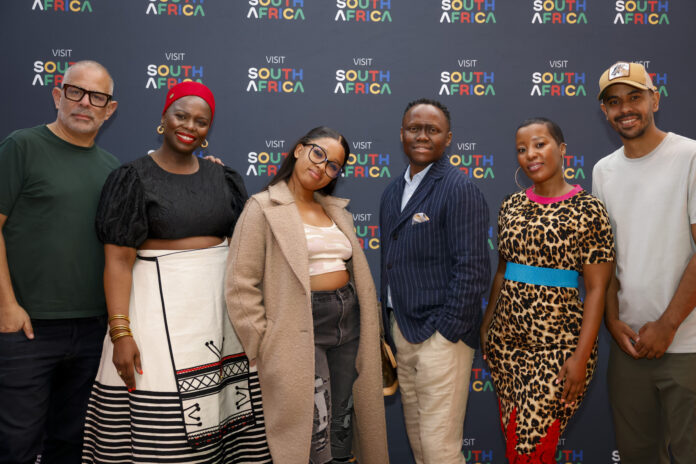The distinctive sound of the log drum permeated the air as several musicians, producers and industry experts gathered in Miami to celebrate the burgeoning genre of Amapiano. With a sound best described as a hybrid of deep house and jazz with percussive loops reminiscent of lounge music coupled with soulful vocals, Amapiano is arguably South Africa’s hottest new export, and its infectious sound continues to attract new audiences as the genre spreads like wildfire. South African Tourism presented an industry-focused panel discussion in collaboration with Maphike Attorneys Inc., providing an opportunity for creators of this musical style to speak about the cultural impact of Amapiano and discuss the genre’s future as it continues to gain popularity worldwide.

Taking place on the eve of the inaugural Afro Nation Miami, which boasts an Amapiano stage, the panel discussion included artists Pabi Cooper and DJ AYA who were joined by several industry executives including: Yoel Kenan, CEO of Africori, Devon Peterson, Creative Director of Africori, Manaileng Maphike, Attorney at Maphike Attorneys Inc. and Jerry Mpufane, President of South African Tourism North America. The discussion was moderated by Yolanda Sangweni, Vice President of Programming and New Content Development at NPR with opening remarks by Justin Barnette, Head of Marketing and Communications of South African Tourism North America. The conversation dove into a wide range of topics including the cultural significance of this new music genre, the impact of its growing popularity worldwide, and the spotlight it has cast on South Africa and its people, fueling industries such as tourism in growing source markets.
Amapiano was born out of the townships of Gauteng province with a distinctive character that is rooted in another uniquely South African musical style, Kwaito. The South African youth who grew up on the sounds of Kwaito have led the creation of Amapiano, a musical style that is distinctly characterized by its use of the log drum which serves as the sound for the baseline. But while Kwaito reflected the struggles of apartheid, Amapiano boasts a more optimistic tone of a young generation that strives to be unapologetically South African. In fact, in South Africa Amapiano has become a culture with its own fashions and styles and its own speech and dance form gaining mainstream popularity.
“As Amapiano makes its way around the world it’s another way in which South Africa’s history and culture demonstrates its global influence,” said Jerry Mpufane, President of South African Tourism North America. “Amapiano is born out of the soul of South Africa, and they say one of the best ways to experience it to its fullest is to be where the music is. So as this genre continues to captivate global audiences, we hope it inspires them to visit South Africa and learn about the history and culture that influenced the creation of Amapiano.”
Today, Amapiano music can be found in clubs, bars, and music venues across South Africa but there are certain places where one might come across the artists who have been instrumental in Amapiano’s rapid rise to the world stage. Travelers arriving in Johannesburg can head south to Soweto, the birthplace of Kwaito,.. Several of the panelists emphasized that understanding South Africa’s history allows one to better understand how South Africa’s freedom became intertwined with the musical styles that gave the people a platform to express their experiences through sound, movement, and lyrics. In Soweto there are plenty of venues to choose from where one can regularly hear the sounds, or even catch a performance by local Amapiano musicians, like Amapiano pioneer and record label owner, Kabza De Small, Njelic or Kamo Mphela, at venues such as Konka, Zone 6 or Disoufeng.
Pretoria, known as the birthplace of Amapiano, is home to a number of influential Amapiano musicians such as Pabi Cooper, Focalistic, Chicco, Mellow and Sleazy (who make up a collective called Pitori Super League) and the likes of Vigro Deep. In Pretoria, one can enjoy the latest and most popular new hits at high-end lounge/restaurant Ayepyep which boasts two locations in the city (and a third now in Cape Town) and night club, ZanZou. Visitors can experience the authentic sounds at festivals including Straata Nation Address and Mamelodi’s outdoor music festival at Moretele Park that draws thousands of revelers annually.
While the best place to experience Amapiano is in its birthplace of South Africa, the genre has made its way to clubs, festivals, and bars worldwide, a testament to how infectious the sounds truly are. As a relatively young underground genre, Amapiano could have easily been stifled by the onset of the pandemic but instead it flourished. The artists noted that Amapiano originated in home studios so it is faithfully poetic the genre would reach audiences at home through social platforms while millions of people were on lockdown. Its popularity was largely driven by viral dance challenges, building an appetite for the genre internationally.
Amapiano boasts a unique representation of women with many of the genre’s biggest names like Uncle Waffles, Pabi Cooper, TXC and Kamo Mphela, paving the way not only for South African women creators but creators from across the diaspora. It’s not enough to say the women are influencing Amapiano as they are in fact defining it through the connection of movement and energy in the dance styles. The future of Amapiano is one full of possibilities as the young artists and creators continue to put their unique stamp on the genre and bring it to the world.

